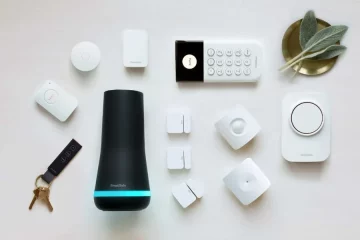How to Choose the Best Electronics for Your Lifestyle and Budget

Electronics for Your Lifestyle | Mykaba
In today’s fast-paced world, technology has become an integral part of our daily lives. From smartphones to laptops and smartwatches, electronic devices have made our lives easier and more convenient. However, with so many options available in the market, it can be overwhelming to choose the best electronics that meet your lifestyle and budget. Whether you’re a tech enthusiast or a casual user, finding the right electronic device can be a daunting task. But worry not, because in this article, we’ll guide you through the process of selecting the best electronics that cater to your specific needs. We’ll cover everything from the latest trends in the electronics industry to key factors to consider before making your purchase. So, whether you’re looking for a new smartphone or a high-performance laptop, keep reading to learn how to choose the best electronics for your lifestyle and budget.
Understanding your lifestyle and needs
The first step in choosing the right electronics is to understand your lifestyle and needs. Are you a student who needs a laptop for online classes and research, or are you a professional who requires a high-performance laptop for work-related tasks? Do you need a smartphone with the latest features, or are you content with a basic phone that can make calls and send texts? These are some of the questions you should ask yourself before making a purchase.
Knowing your lifestyle and needs will help you narrow down your options and choose the right electronic device. For example, if you’re a student, you may need a laptop that is lightweight and easy to carry around. If you’re a professional, you may need a laptop that has a powerful processor and a large storage capacity. If you’re a gamer, you may need a laptop with a dedicated graphics card and a high refresh rate display. Understanding your lifestyle and needs will help you choose an electronic device that meets your specific requirements.
Setting a budget
Once you have a clear understanding of your lifestyle and needs, the next step is to set a budget. Electronics can be expensive, and it’s important to determine how much you can afford to spend before making a purchase. Setting a budget will help you choose an electronic device that fits your financial constraints.
When setting a budget, consider the features you need and the quality of the device. High-end electronics may offer more features and better quality, but they can also be more expensive. On the other hand, budget electronics may have limited features and lower quality, but they can be more affordable. It’s important to find a balance between features and quality and your budget.
Researching different types of electronics
After identifying your lifestyle and needs and setting a budget, the next step is to research different types of electronics. The electronics market is constantly evolving, and new gadgets and devices are released every year. It’s important to stay up-to-date with the latest trends and technologies to make an informed decision.
Research different types of electronics by reading reviews, watching product demos, and visiting electronics stores. Online marketplaces like Amazon and Best Buy offer customer reviews and ratings, which can give you an idea of the product’s performance and quality. Product demos on YouTube can give you an in-depth look at the device’s features and performance. Visiting electronics stores can allow you to see and touch the device before making a purchase.
Factors to consider when choosing electronics
When choosing electronics, there are several factors to consider. These factors can include the device’s operating system, processor, storage capacity, battery life, camera quality, and screen size. Let’s take a closer look at some of these factors.
The operating system is the software that runs the device. Popular operating systems for smartphones and laptops include Android, iOS, Windows, and macOS. Each operating system has its own benefits and drawbacks, and it’s important to choose one that fits your needs.
The processor determines how fast the device can perform tasks. Processors are measured in gigahertz (GHz), and higher GHz means faster performance. If you’re a professional or a gamer, you may need a processor with a higher GHz.
Storage capacity is the amount of space available on the device to store files, photos, and videos. If you need to store a lot of files, you may need a device with a larger storage capacity.
Battery life is the amount of time the device can operate on a single charge. If you’re a heavy user, you may need a device with a longer battery life.
Camera quality is important if you use your device to take photos and videos. If you’re a photographer or a vlogger, you may need a device with a high-quality camera.
Screen size is important if you use your device to watch videos or play games. If you’re a gamer or a movie buff, you may need a device with a larger screen size.
Best electronics for different lifestyles
Different lifestyles require different types of electronics. Let’s take a look at some of the best electronics for different lifestyles.
For students, a lightweight laptop with a long battery life is ideal. The MacBook Air or the Dell XPS 13 are great options for students.
For professionals, a high-performance laptop with a large storage capacity is ideal. The MacBook Pro or the Dell Precision 5550 are great options for professionals.
For gamers, a high-performance laptop with a dedicated graphics card and a high refresh rate display is ideal. The Asus ROG Zephyrus G14 or the Acer Predator Triton 500 are great options for gamers.
For casual users, a smartphone with a long battery life and a good camera is ideal. The iPhone 11 or the Google Pixel 4a are great options for casual users.
Best electronics for different budgets
Different budgets require different types of electronics. Let’s take a look at some of the best electronics for different budgets.
For low-range budgets, budget smartphones like the Moto G Power or the Nokia 5.3 are great options. For laptops, the HP Pavilion or the Lenovo IdeaPad are great options.
For mid-range budgets, mid-range smartphones like the OnePlus Nord or the Samsung Galaxy A71 are great options. For laptops, the Lenovo Yoga C740 or the HP Envy x360 are great options.
For high-range budgets, high-end smartphones like the iPhone 12 or the Samsung Galaxy S21 Ultra are great options. For laptops, the MacBook Pro or the Dell XPS 15 are great options.
Reviews and recommendations for popular electronics
To help you make an informed decision, here are some reviews and recommendations for popular electronics.
The MacBook Air is a great option for students and casual users. It’s lightweight, has a long battery life, and is easy to use.
The Dell XPS 13 is a great option for professionals. It has a powerful processor, a large storage capacity, and a sleek design.
The Asus ROG Zephyrus G14 is a great option for gamers. It has a dedicated graphics card, a high refresh rate display, and a lightweight design.
The iPhone 11 is a great option for casual users. It has a long battery life, a good camera, and a user-friendly interface.
Tips for buying electronics
Before making a purchase, here are some tips to keep in mind.
Read reviews and ratings from other customers to get an idea of the product’s performance and quality.
Compare prices from different retailers to find the best deal.
Consider buying refurbished electronics to save money.
Check for warranties and return policies before making a purchase.
Conclusion
Choosing the best electronics for your lifestyle and budget can be a daunting task, but with the right information, it can be a breeze. By understanding your lifestyle and needs, setting a budget, researching different types of electronics, and considering key factors, you can choose the right electronic device that meets your specific requirements. Whether you’re a student, a professional, a gamer, or a casual user, there’s an electronic device out there that fits your lifestyle and budget.









